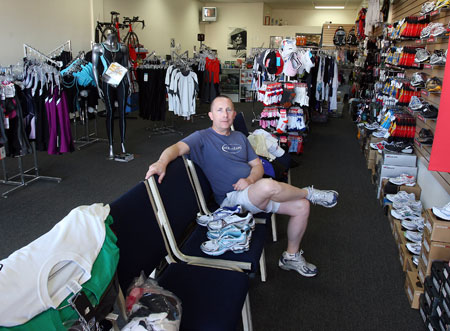Nevada’s taxable sales fall 18.9 percent
We’re running out of words to describe the sustained slide in Nevada’s taxable sales.
Grim? Used on a 5.4 percent dip in February 2008.
Plunged? That went to characterize a 6.2 percent drop in October.
Plummeted? Claimed by a 12.9 percent falloff in January.
And none of those declines came close to the taxable sales free-fall the state and Clark County experienced year over year in February.
The 18.9 percent statewide skid and the county’s 19.6 percent drop not only were the worst yet of the 16-month-old recession, they looked to be the biggest annual decreases in Nevada’s modern history.
Brian Gordon, a principal in policy-research firm Applied Analysis, scanned records back to 1980, and he couldn’t find a steeper drop. His description of the latest sales results: “Abysmal.”
Taxable sales across Nevada went from $3.6 billion to $2.9 billion year over year in February, while sales in Clark County fell from $2.8 billion to $2.2 billion.
Considering the economy already was in recession in February 2008, when taxable sales dropped 3.1 percent, the newest numbers show how the state’s economic decline accelerated through the winter, Gordon said. February brought the fourth consecutive month of double-digit declines in taxable sales.
A few factors pushed the decline, Gordon said.
First, banks ended their foreclosure moratorium, so more locals grappled in early 2009 with mortgage difficulties and tightened their belts.
Second, an 18 percent decline in statewide gaming revenue indicated that fewer visitors spent fewer dollars in Nevada, meaning the local economy suffered twofold as both locals and tourists scaled back on spending.
Plus, 2008 was a leap year, though one less day for February sales this year yielded perhaps just 3.5 percent of the decline, Gordon said.
The 20 percent drop in local sales tracks “exactly” with what Larry Lahodny, principal owner of Las Vegas Multisport, said he has seen at his sporting goods store.
From its 2006 opening through May 2008, business expanded, but sales tanked from June on, Lahodny said.
“We thought we had skated by, but things went ugly quick. Winter was really unpleasant.”
Some parts of Lahodny’s business remain strong, including demand for triathlon accessories and nutrition items. But Las Vegas Multisport has few takers these days for high-end goods such as $700 wet suits and $2,400 sets of racing wheels for bicycles.
To adjust, Lahodny cut hours among employees and took on more work himself. He also orders merchandise only as he needs it, rather than buying products in advance of a new season.
Slumping sales across the board mean fewer dollars for state services such as prisons and schools. State collections from sales and use taxes on goods sold in Nevada fell 18.2 percent to $220.4 million. In the first eight months of fiscal 2009, which began July 1, revenue collections on sales and use taxes fell 10.4 percent compared with the same period a year earlier.
The General Fund portion of sales and use taxes was $12.6 million, or 1.4 percent, below projections of the Economic Forum, a forecasting group that estimates incoming revenue for state government.
The forum is scheduled to release its latest findings Friday, giving the state Legislature guidelines on how much money lawmakers will have for their budget.
Gordon said February’s revenue numbers mean legislators face “worse than a worst-case scenario.”
Automobile dealers and furniture stores continued to bear the brunt of the recession in February, with taxable sales falling 43.1 percent year-over-year for car and car-parts retailers and transactions dropping 30.4 percent for furniture stores. Construction-related sales were off 40 percent. Food services and drinking places posted 9.9 percent lower sales, while sales inside food and beverage stores were flat, creeping up 0.2 percent.
But support activities for mining increased sales by 221.5 percent, while transactions at walk-in health clinics jumped 331.4 percent.
Business was up about 4 percent in the last year for Unit Chemical Corp., a Henderson manufacturer of detergents and disinfectants for the hospitality sector, as well as for airplanes and buses.
Ray Chaplar, Unit’s president, credited the gain to two factors: About 97 percent of the company’s business happens outside Nevada, so the company doesn’t rely on hard-hit local markets for sales. Plus, companies looking to trim budgets are shopping around for competitive prices on industrial cleaners .
Chaplar said Nevada’s leaders could help turn around the ailing economy if they promoted the advantages of moving operations to the state.
“You don’t create jobs here. You just have to steal them from somewhere else,” said Chaplar, who relocated his company from Southern California four years ago.
“For people in California, with the tax climate being what it is, Nevada is a great place to locate a business.”
Excise taxes posted mixed results. For fiscal 2009, cigarette taxes were $756,000, or 0.75 percent below projections . The liquor tax beat expectations, bringing in $746,000, or 1.9 percent, more than projected. Collections on the state’s live-entertainment tax were $651,184, or 7.11 percent, below projections.
Contact reporter Jennifer Robison at jrobison@reviewjournal.com or 702-380-4512.

















